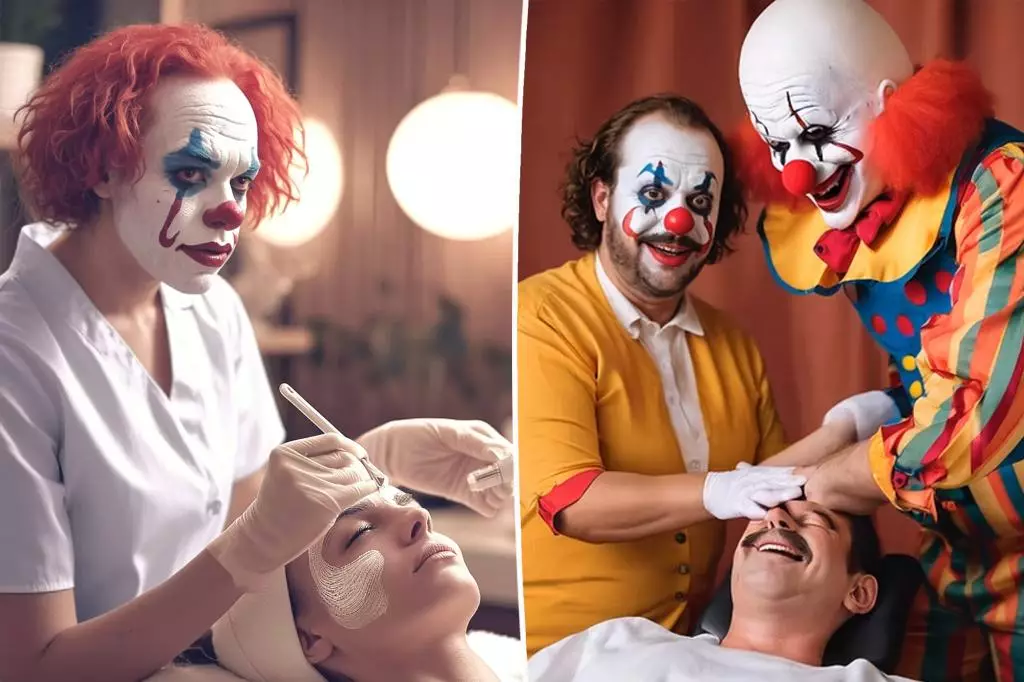In a world where traditional wellness practices often take themselves too seriously, a fresh wave of humor has burst forth from the shimmering sands of East Hampton. An anonymous group, likely local residents familiar with the area’s high-profile culture, has orchestrated a delightful satire that plays on the aesthetic and aspirations of wellness enthusiasts through the lens of clown-inspired therapies. Dubbed “East Hampton Clown Massage,” this jest not only utilizes wit to mock but also innovatively critiques a culture often perceived as over-the-top.
The concept is whimsical: imagine clown characters providing massages on the beach, dressed in their colorful garb, complete with oversized shoes and red noses. While some may roll their eyes at the absurdity, many others are drawn into the lure of combining relaxation with a good laugh. The website’s clever design enhances the playful authenticity of this endeavor, showcasing clowns in various massage poses while offering an array of fictitious treatment options that sound as ridiculous as they are amusing.
A Nod to Local Lore
Humor is often most impactful when it’s relatable, and this parody successfully taps into the rich tapestry of Hamptons lore. The faux testimonials are a sharp wink to the elite social scene, referencing notable personalities and events that those in the know would instantly recognize. One highlight is an outrageous claim from “Lizzie G., socialite and Mercedes owner,” a jab at a prominent figure notorious for a past scandal. This reference not only enhances the parody but also speaks to the accessibility of humor; it invites those familiar with the Hamptons’ history to join in on the joke.
The playful services offered range from the absurd, like the “Scream, Tummy Tickle,” to “Joeky Reiki Bakey,” inviting participants to engage not just physically but also emotionally. The essence of clowning—inviting laughter and joy—sits at the core of the experience, acts as a lighter alternative to the overwhelmingly serious wellness retreats often marketed in the region. It seems to pose the question: What if healing could be playful instead of clinical?
Embracing Absurdity in Wellness
The bravery of these pranksters lies not only in the cleverness of their endeavor but also in their commentary on wellness culture itself. This subcategory of self-care often skews towards the extravagant, prioritizing exclusivity and celebrity endorsements. The site’s mock products, such as $250 clown make-up remover, cynically underscore the absurdity of consumerism in wellness. The creators behind this masterpiece aren’t merely jesting; they’re leveraging irony to critique an industry that sometimes seems more focused on brand integrity than genuine well-being.
“Joeky,” the so-called Duke product and crypto aficionado, epitomizes how this parody taps into the intersection of hipness and absurdity. His outlandish hobbies portray a caricature of self-styled gurus who often idealize wealth, success, and wellness in equal measure. In a world inundated with “influencers” touting their success while shilling the latest self-care fad, the creation of “Krusty,” who revels in plant medicine and wild retreats, provokes reflection on the authenticity of such experiences.
The Art of Satire as Cultural Commentary
The cleverness of the “East Hampton Clown Massage” lies not just in its lighthearted approach, but also in its savvy understanding of its audience. The creators slap a question mark on the perks of wellness culture—what are we truly seeking in our pursuit of health? Is it a deeper connection or merely an escape from our realities? By dressing this introspection in vibrant colors and a comedic lens, they successfully provoke thought under the guise of a jocular facade.
Moreover, the mock Vanity Fair interview with “Joeky” exemplifies the lengths at which the pranksters go to craft a narrative that not only reflects absurdity but challenges it. The picture of a clown with music stars confers a sense of legitimacy, drawing attention to the influence of celebrity culture in shaping our own perceptions of wellness. “Wellness,” as portrayed in the farcical article, is reduced to unbridled ludicrousness while hinting at our collective willingness to buy into whatever fits the label.
Ultimately, the “East Hampton Clown Massage” serves as a vibrant critique of not only local wellness culture but a broader examination of the self-care movement. It asks pertinent questions amid laughter—what constitutes genuine wellness, and how have we strayed from the core tenet of its practice? In a world where healing can often feel daunting, a little joy might be just what we need.

Leave a Reply